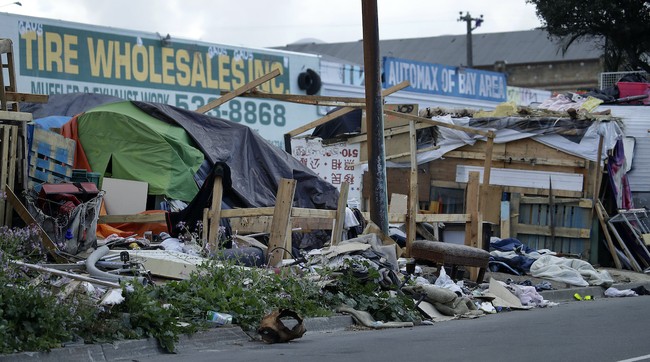Vestiges of sanity are returning to at least one West Coast city, as San Diego has taken some solid steps towards cleaning up the homeless encampments on their streets. The people of that city are discovering, no doubt to their endless wonder, that clean, clear sidewalks are much more pleasant than walkways covered with tents, discarded needles, and feces.
Who knew? Washington Examiner commentary writer Zachary Faria writes in a new op-ed:
San Diego has discovered that cleaning up homeless encampments makes sidewalks walkable and people safer. Who could have possibly guessed this?
Police have begun enforcing the city’s ban on public camping within two blocks of schools, shelters, trolley stations, waterways, and parks. The locations that have been cleared are now no longer clogged with tents, tarps, and trash. As it turns out, even the threat of cleaning out encampments has led several areas to become cleaner as homeless people moved locations to avoid the hassle.
There are more lessons to be learned from San Diego’s bold decision to look like a proper, civilized city. Homeless encampments are public health hazards due to the combination of trash, urine, feces, and drugs (occasionally). That is why San Diego is enforcing the ban near parks and waterways. But San Diego police also made several arrests during their sweeps for people with outstanding warrants.
For comparison, this is what San Diego looked like only two months ago.
San Diego’s reversal on street camping is a rare instance of sanity in a state that has increasingly gone nuts, on this issue as well as others, leaving the citizenry to find their own (often creative) ways of dealing with the problem.
The city of San Diego is learning some additional lessons into the bargain, Faria writes, ones that would seem staggeringly obvious to anyone who isn’t a liberal Democrat.
What’s more, San Diego learned that many homeless people are indeed choosing to be homeless. Nobody at the encampment at Balboa Park that was cleared out accepted the offer for shelter, a fact that comes as no surprise to anyone but the few activists who genuinely believe that shelter space is the only issue in the homelessness debate.
As Texas and Georgia have seen, you do not need to funnel money through organizations that “advocate” for homeless people by allowing them to fall further into drug addiction, and you do need to have some enforcement mechanism to get homeless people into diversion programs or shelters. And, as San Diego is now seeing, it also allows your city to become cleaner and safer. Again, who could have guessed?
It’s important to note that this isn’t just an issue of cosmetics. Homeless encampments mess up the streets and make the city ugly, sure, but they are also a major health hazard. In the last few years, just up the coast in Los Angeles, there have been outbreaks of typhus, tuberculosis, hepatitis A, and shigellosis, all diseases spread through lice, unsafe personal contact, and/or poor sanitation.
And, when you look at the encampments in Los Angeles—and San Francisco, Seattle, Portland, and in quite a few other major cities—look at the feces, the puddles of urine, the discarded needles, the garbage, you can see why. These conditions are disease outbreaks looking for a place to happen. For Pete’s sake, the ancient Romans knew better than this!

This isn’t an issue that can be allowed to continue. It just can’t. This isn’t a matter of discrimination against the homeless. There are policies, sure, that could help some around the edges, like undoing stupid land-use restrictions and allowing easier development of cheaper housing. But those things will only help around the margins because as San Diego has learned, there is at least a plurality of the homeless who intend to stay that way. This is partly a mental health issue, yes, but mostly this is a public health issue. San Diego is beginning to deal with this; and thankfully before a serious outbreak of some disease from the Dark Ages. Perhaps some of our other major cities will look to San Diego for an example.
I doubt that many will. But, as someone once wrote, hope springs eternal. For the municipalities that ignore San Diego’s example, I can only provide another quote from the same source:
Who sees with equal eye, as God of all,
A hero perish, or a sparrow fall,
Atoms or systems into ruin hurl’d,
And now a bubble burst, and now a world.



